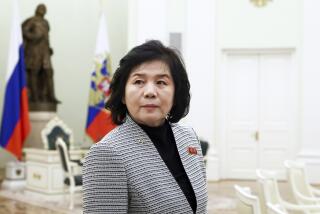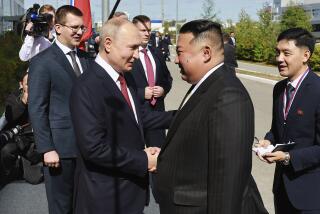China OKs Soviet Summit in Mid-May
- Share via
BEIJING — Soviet President Mikhail S. Gorbachev will visit China May 15-18 for the first Sino-Soviet summit meeting in 30 years, the Chinese Foreign Ministry announced Sunday.
At the same time, the two countries issued a joint communique on the Cambodian conflict, listing many points of agreement but differing on how to achieve reconciliation among the warring factions.
Beijing and Moscow agreed, however, that free elections should be conducted in Cambodia after a Vietnamese troop withdrawal and that there should be international guarantees for the country’s status as an “independent, peaceful, neutral and nonaligned state.”
Diplomats here said that a last-minute argument over the wording of the communique was apparently the cause of an unusual public disagreement between Soviet and Chinese officials Saturday over whether the actual dates of the summit meeting had been fixed.
Disagreed at First
Soviet Foreign Minister Eduard A. Shevardnadze, said at the end of a four-day visit to China that the two sides had agreed to hold the summit in mid-May. But immediately afterward, Chinese Vice Foreign Minister Tian Zengpei contradicted Shevardnadze, saying that mid-May was only a proposal by the Soviet side and that no agreement had been reached on the specific dates.
Soviet support for Vietnam’s decade-long intervention in Cambodia has been a major obstacle to improved Sino-Soviet relations.
China has insisted that the Vietnamese-installed Phnom Penh government be dismantled as part of any peace settlement. The Soviet side, however, refused to agree to this, and the communique was released with the dispute unresolved.
The communique confirms an agreement between Beijing and Hanoi on Vietnamese troop withdrawals matched with a cutoff of Chinese aid to the Cambodian resistance.
Withdrawal Noted
The communique notes “the decision announced by Vietnam to withdraw all its troops from Cambodia by the end of September, 1989, at the latest.”
“With the withdrawal of Vietnamese troops from Cambodia, all countries concerned should gradually reduce and eventually totally stop their military aid to any of the parties in Cambodia,” it adds.
Both sides agreed that the four main factions in Cambodian--three in the resistance coalition and one that now controls the Phnom Penh government--should join under Cambodia’s former ruler, Prince Norodom Sihanouk, to work out details of political reconciliation. Sihanouk now leads one of the resistance factions.
But in the key point of disagreement, China advocates that such a quadripartite coalition should form a provisional government. The Soviet Union agreed only that such a “provisional organ” should be formed to “implement agreements reached by the parties in Cambodia and to conduct free elections.”
Disagreement on Formula
The Soviet formula could leave the present Phnom Penh government in power during elections, and China insists that this is unacceptable.
The communique also calls for “an effective international control mechanism to be established and exercise strict international supervision over Vietnamese troop withdrawal, cessation of foreign military aid, maintenance of peace in Cambodia and conduct of free elections.”
The Khmer Rouge--which ruled Cambodia from 1975 through 1978 with a tyrannical regime under which more than 1 million people are estimated to have died--is the strongest resistance faction. There has been widespread concern that it might take power again.
The communique contains a vaguely worded yet clear warning that neither China nor the Soviet Union wants to see a return to the murderous policies the Khmer Rouge engaged in while in power.
More to Read
Sign up for Essential California
The most important California stories and recommendations in your inbox every morning.
You may occasionally receive promotional content from the Los Angeles Times.













